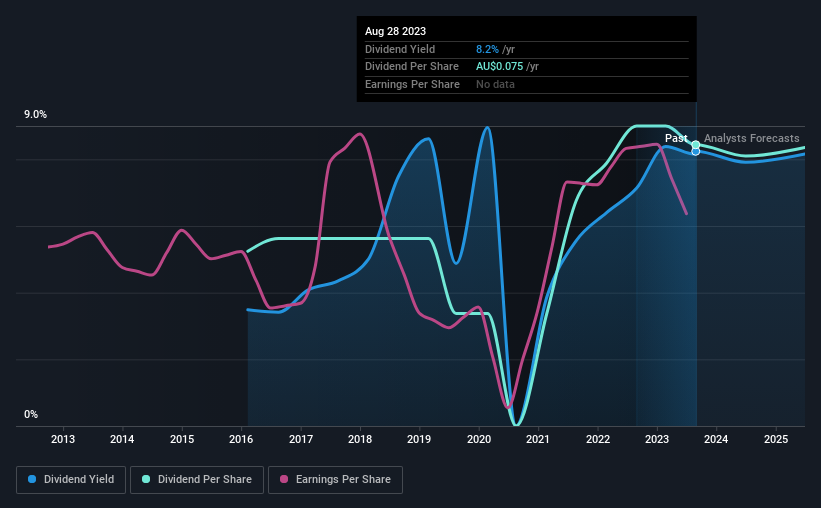- Australia
- /
- Specialty Stores
- /
- ASX:MHJ
Michael Hill International (ASX:MHJ) Is Reducing Its Dividend To A$0.035

The board of Michael Hill International Limited (ASX:MHJ) has announced that the dividend on 22nd of September will be reduced by 12% from last year's A$0.04 to A$0.035. The yield is still above the industry average at 8.2%.
View our latest analysis for Michael Hill International
Michael Hill International's Dividend Is Well Covered By Earnings
We like to see robust dividend yields, but that doesn't matter if the payment isn't sustainable. The last payment made up 81% of earnings, but cash flows were much higher. Since the dividend is just paying out cash to shareholders, we care more about the cash payout ratio from which we can see plenty is being left over for reinvestment in the business.
The next year is set to see EPS grow by 13.5%. If the dividend continues along recent trends, we estimate the payout ratio will be 72%, which would make us comfortable with the sustainability of the dividend, despite the levels currently being quite high.

Michael Hill International's Dividend Has Lacked Consistency
Even in its relatively short history, the company has reduced the dividend at least once. This makes us cautious about the consistency of the dividend over a full economic cycle. Since 2016, the annual payment back then was A$0.0466, compared to the most recent full-year payment of A$0.075. This means that it has been growing its distributions at 7.0% per annum over that time. A reasonable rate of dividend growth is good to see, but we're wary that the dividend history is not as solid as we'd like, having been cut at least once.
The Dividend's Growth Prospects Are Limited
With a relatively unstable dividend, it's even more important to evaluate if earnings per share is growing, which could point to a growing dividend in the future. Earnings have grown at around 2.5% a year for the past five years, which isn't massive but still better than seeing them shrink. Slow growth and a high payout ratio could mean that Michael Hill International has maxed out the amount that it has been able to pay to shareholders. This isn't the end of the world, but for investors looking for strong dividend growth they may want to look elsewhere.
In Summary
Overall, it's not great to see that the dividend has been cut, but this might be explained by the payments being a bit high previously. In the past, the payments have been unstable, but over the short term the dividend could be reliable, with the company generating enough cash to cover it. We would probably look elsewhere for an income investment.
Market movements attest to how highly valued a consistent dividend policy is compared to one which is more unpredictable. However, there are other things to consider for investors when analysing stock performance. Taking the debate a bit further, we've identified 1 warning sign for Michael Hill International that investors need to be conscious of moving forward. Looking for more high-yielding dividend ideas? Try our collection of strong dividend payers.
New: Manage All Your Stock Portfolios in One Place
We've created the ultimate portfolio companion for stock investors, and it's free.
• Connect an unlimited number of Portfolios and see your total in one currency
• Be alerted to new Warning Signs or Risks via email or mobile
• Track the Fair Value of your stocks
Have feedback on this article? Concerned about the content? Get in touch with us directly. Alternatively, email editorial-team (at) simplywallst.com.
This article by Simply Wall St is general in nature. We provide commentary based on historical data and analyst forecasts only using an unbiased methodology and our articles are not intended to be financial advice. It does not constitute a recommendation to buy or sell any stock, and does not take account of your objectives, or your financial situation. We aim to bring you long-term focused analysis driven by fundamental data. Note that our analysis may not factor in the latest price-sensitive company announcements or qualitative material. Simply Wall St has no position in any stocks mentioned.
About ASX:MHJ
Michael Hill International
Owns and operates jewelry stores and provides related services in Australia, New Zealand, and Canada.
Very undervalued with adequate balance sheet.
Similar Companies
Market Insights
Community Narratives




